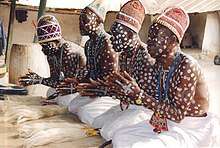Olodumare
Olodumare (Yoruba: O-lo-dù-ma-rè) also known as Ọlọrun (Almighty) is the name given to one of the three manifestations of the Supreme God or Supreme Being. [1] Olodumare's name comes from the words Odu, Mare, and Oni, which translates as "the owner of the source of creation" [2] in the Yoruba pantheon. Olodumare is the Supreme Creator.[1]
| Part of a series on |
| Yoruba religion (Òrìṣà-Ifá) |
|---|
 |
|
Variants
|
|
Sacred sites |
|
Legendary figures |
The Yoruba believe Olodumare is omnipotent and is also responsible for the creation of all life.[3] Yoruba followers believe Olodumare participates in a calm, restful, rather inactive life. He is not interested or involved when it comes to Earthly matters and lets other orishas, who are described as his sons and daughters, answer human concerns through divination, possession, sacrifice and more.[4] Yoruba tradition says everything is in the hands of God (Olodumare) when they are going to bed at night.[3]
The name Olodumare symbolises a divine "Entity" following these characteristics: not having a father or mother; one that and is not bound by space.[5]
Historically, the Yoruba did not worship Olodumare, there is no specific shrine and no sacrifice is often made towards their way.[6] There is contradiction about whether or not Olodumare is directly worshiped due to his disinterest in humanity. [4] Yoruba consider Olodumare to be the origin of virtue and mortality. Is believed to bestow the knowledge of things upon all persons at the time of their birth. He is described as omnipotent, transcendent, unique, all knowing, good, and evil.[4]The Yoruba call on Olodumare when other deities (orishas) are unwilling to help or seem incapable.[5] These orisa or orishas are supernatural beings both good (egungun) and bad (ajogun) who represent human activity and natural forces.[7]Yoruba believe Olodumare created all other forces of the universe to help continue the evolution of the universe.[3]
Stories of Olodumare
There is a Yoruba story of Olodumare sitting up in the heavens, holding back the rain due to the misbehavior of other orishas. Rather than eliminate them he watched them learn from their mistakes and suffer in the drought. The orishas suffered until they begged for forgiveness, but Olodumare could not hear because he was too high in the heavens. Orishas could not reach where he was. The smallest orisha, Oshun [4] volunteered to try to get to Olodumare. She became a peacock and flew up into the heavens, burning up and scorching her feathers along the way. Her feathers fell off and she transformed into a vulture, but she never gave up and kept on flying. Her determination led her to Olodumare. He saw how beat up she was and how hard she persevered and appreciated her drive, awarding her with bringing back the rain. She was given the job of messenger, the only orisha allowed into the heavens to communicate with Olodumare. [8]
References
- Cynthia Duncan,Ph.D. About Santeria
- Ayegboyin, Deji; Olajide, S. K. (2009), "Olodumare", Encyclopedia of African Religion, SAGE Publications, Inc., doi:10.4135/9781412964623.n306, ISBN 9781412936361, retrieved 2019-10-10
- DAYO, CHIEF (February 14, 2016). "YORUBA BELIEVE IN ONLY ONE GOD CALLED OLODUMARE".
- Bewaji, John (1998). "Olodumare: God in Yoruba Belief and the Theistic Problem of Evil" (PDF). African Studies Quarterly.
- "Brown Williams". Retrieved 2018-10-18.
- R., Prothero, Stephen (2010). God is not one : the eight rival religions that run the world (First HarperCollins paperback ed.). [New York, New York]. ISBN 9780061571282. OCLC 726921148.
- Peel, JYL (2016). "The Three Circles of Yoruba Religion". University of California Press: 214–232 – via JSTOR.
- "Oshun Loses Her Beauty". UUA.org. 2013-07-09. Retrieved 2019-10-10.